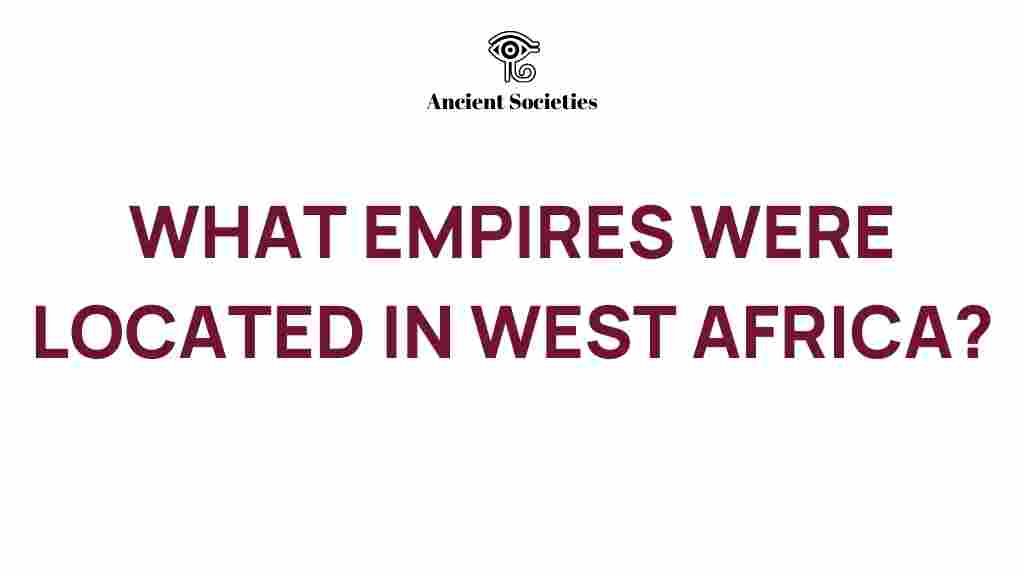Unveiling the Secrets of West Africa’s Forgotten Empires
West Africa is a region rich in history and cultural heritage, home to several ancient civilizations that have played a significant role in shaping the world we know today. The forgotten empires of West Africa, such as the Ghana, Mali, and Songhai empires, were once powerful entities that thrived on trade routes and cultural exchanges. This article aims to explore these empires, their societal impact, and the legacy they left behind.
Understanding the Historical Context
The history of West Africa is marked by the rise and fall of numerous empires that contributed significantly to the region’s cultural heritage. These empires were not only political powers but also centers of trade and learning. They established various trade routes that facilitated the exchange of goods and ideas across vast distances.
- Ghana Empire: Flourished between the 6th and 13th centuries, known for its wealth in gold.
- Mali Empire: Reached its peak in the 14th century, famous for the legendary king Mansa Musa.
- Songhai Empire: Emerged in the 15th century, it was one of the largest empires in African history.
The Rise of Trade Routes
Trade routes were the lifeblood of these empires, connecting them to other regions of Africa and beyond. The trans-Saharan trade routes enabled the exchange of gold, salt, ivory, and slaves, facilitating economic growth and cultural exchanges. The impact of these trade routes was profound, leading to:
- Increased wealth and power for empires.
- Cultural diffusion, including the spread of Islam and education.
- The establishment of cities as centers of commerce and learning, such as Timbuktu.
Archaeology and Discovering Forgotten Empires
Archaeological efforts in West Africa have unveiled significant findings that provide insights into these ancient civilizations. Excavations have revealed:
- Ruins of ancient cities, including structures that showcase advanced architectural skills.
- Artifacts that illustrate the daily lives, trade practices, and religious beliefs of the people.
- Evidence of sophisticated agricultural practices and social organization.
These discoveries not only highlight the ingenuity of West Africa’s ancient civilizations but also emphasize the importance of preserving this cultural heritage for future generations. For more detailed insights into archaeological findings, visit National Geographic.
Societal Impact of the Empires
The empires of West Africa had a lasting societal impact that resonates even today. Their legacies can be seen in various aspects, such as:
- Political Structures: The governance systems established by these empires influenced modern political frameworks in West African nations.
- Education and Scholarship: The rise of learning centers like Timbuktu laid the foundation for education in West Africa, promoting literacy and scholarship.
- Cultural Identity: The empires fostered a sense of identity and unity among diverse ethnic groups, contributing to the rich tapestry of West African culture.
Legacy of West Africa’s Empires
The legacy of West Africa’s forgotten empires is multifaceted, impacting not only the region but also the broader African continent and the world. Key aspects of this legacy include:
- Trade and Economy: The traditions of trade established during these empires continue to influence economic practices in West Africa.
- Religion and Spirituality: The spread of Islam and indigenous beliefs during the empire periods shaped the spiritual landscape of West Africa.
- Art and Literature: The artistic and literary contributions from these empires have enriched global culture.
Step-by-Step Process: Exploring West Africa’s Rich History
For those interested in delving deeper into the history of West Africa’s empires, here’s a step-by-step guide:
- Research the Empires: Begin with a broad overview of the Ghana, Mali, and Songhai empires. Look for reputable sources, books, and documentaries.
- Explore Trade Routes: Understand the significance of trade routes and how they shaped the economies and cultures of the empires.
- Visit Archaeological Sites: If possible, plan visits to important archaeological sites in West Africa that offer insights into ancient civilizations.
- Engage with Local Historians: Connect with local historians or scholars who specialize in the history of West Africa.
- Participate in Cultural Events: Attend cultural events or festivals that celebrate the heritage and history of West Africa.
Troubleshooting Tips for Researching Ancient Civilizations
When researching the history and cultural heritage of West Africa’s empires, you may encounter some challenges. Here are some troubleshooting tips:
- Verify Sources: Ensure that the information you gather comes from credible sources. Cross-check facts with multiple references.
- Engage with Experts: Reach out to historians or archaeologists who specialize in West African history for accurate insights.
- Be Cautious of Generalizations: Understand that West Africa is diverse; avoid generalizing experiences and histories across different cultures.
- Stay Updated: Follow current archaeological discoveries and historical research to gain new perspectives.
Conclusion
The forgotten empires of West Africa are a testament to the region’s rich history and cultural heritage. From the wealth of the Ghana Empire to the scholarly pursuits of the Mali Empire and the vastness of the Songhai Empire, these ancient civilizations have left an indelible mark on the world. Understanding their histories, trade routes, and societal impacts allows us to appreciate the legacy they have created, which continues to shape modern West Africa today.
As we unveil the secrets of these empires, it becomes crucial to preserve their stories and cultural heritage for future generations. By engaging with this history, we not only honor the past but also enrich our understanding of the present and future of West Africa.
This article is in the category Empires and created by AncientSocieties Team

2 thoughts on “Unveiling the Secrets of West Africa’s Forgotten Empires”